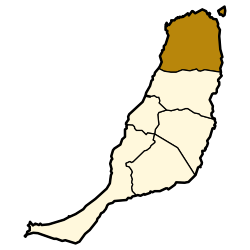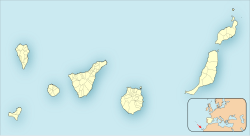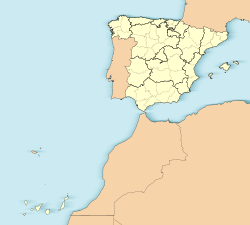La Oliva
This article needs additional citations for verification. (April 2014) |
La Oliva | |
|---|---|
Municipality | |
 Municipal location in Fuerteventura | |
| Coordinates: 28°36′40″N 13°55′40″W / 28.61111°N 13.92778°W | |
| Country | Spain |
| Autonomous Community | Canary Islands |
| Province | Las Palmas |
| Island | Fuerteventura |
| Area | |
• Total | 356.13 km2 (137.50 sq mi) |
| Population (2018)[2] | |
• Total | 25,884 |
| • Density | 73/km2 (190/sq mi) |
La Oliva (pronounced [la oˈliβa]) is a town and a municipality in the northern part of the island of Fuerteventura in the Province of Las Palmas, Canary Islands, Spain. The population is 29,174 (2023),[3] and the area is 356.13 km2.[1] The municipality includes the Lobos Island to the northeast, just off Corralejo.
An anonymous manuscript relates that the town of La Oliva was founded in 1500 by individuals known to the Hernández brothers, residents of Betancuria. La Oliva is also the historic seat of the island's Colonels, who resided in the stately Casa de los Coroneles. Because of this, it succeeded the Villa de Betancuria as the capital of Fuerteventura from 1834 until 1860, when Puerto de Cabras became the new capital.
The largest town of the municipality, Corralejo (14,318 inhabitants in 2023, including Playa de Corralejo), is a port town and major beach resort at the northernmost point of the island. Other major settlements and their 2023 population are Geafond (3,985), Villaverde (2,118), Lajares (2,012), and El Cotillo (1,474); the town of La Oliva had 1,720.[4]
Gallery
[edit]-
"Montaña Quemada" Canyon
-
A stone-built windmill near the beach of La Oliva
-
Church of Our Lady of La Candelaria
-
Corralejo beach
-
Los Lobos Island
-
Casa de los Coroneles, La Oliva
See also
[edit]References
[edit]- ^ a b Instituto Canario de Estadística, area
- ^ Municipal Register of Spain 2018. National Statistics Institute.
- ^ Instituto Nacional de Estadística, Madrid
- ^ Instituto Nacional de Estadística, Madrid: Population of localities according to the municipal register (padrones municipales)
External links
[edit]- La Oliva Information, photos and map Archived 2016-03-04 at the Wayback Machine











